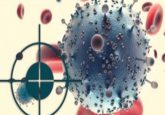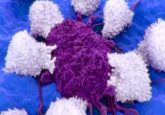Personalized ovarian cancer vaccines set for human trials

A new way to identify protein mutations in cancer cells has been developed by researchers at the University of Connecticut (UConn; CT, USA). The findings, published recently in the Journal of Experimental Medicine, are being used to develop personalized vaccines to treat patients with ovarian cancer.
Pramod Srivastava, director of the Carole and Ray Neag Comprehensive Cancer Center at UConn Health and one of the principal investigators of the study, said: “This has the potential to dramatically change how we treat cancer.” He continues: “This research will serve as the basis for the first ever genomics driven personalized medicine clinical trial in immunotherapy of ovarian cancer, and will begin at UConn Health this fall.”
Once it is approved by the US FDA, the initial clinical study will be run by Angela Kueck, a gynecological oncologist at UConn Health. Her team will sequence DNA from tumors of 15–20 ovarian cancer patients and use the information gained to make a personalized vaccine for each patient.
Ovarian cancer is the focus of the clinical trial as it usually responds well to surgery and chemotherapy initially but often returns, with lethal effect, within 2 years. This gives researchers a window in which to prepare and administer the new vaccines and should allow them to tell within 2 years if the vaccine has made a difference. If the vaccines are found to be safe, a Phase II trial to test clinical effectiveness will be designed.
The basis of the vaccines lies in identifying and exploiting differences in epitopes. In order for the immune system to attack cancer cells it must first recognize them. Every cell in the body has a sequence of proteins on its exterior; these sequences are known as epitopes, which identify cells as healthy. Cancerous cells also have epitopes, which are similar to healthy cells, and so the immune system does not recognize them as cancer cells that should be destroyed; however, cancer cell epitopes have tiny differences that can give them away, if only the immune system knew what to look for.
“We want to break the immune system’s ignorance,” Srivastava commented. For example, there could be 1000 subtle changes in the cancer cell epitopes, but only ten are ‘real’, meaning significant to the immune system.
To identify these real differences, Ion Mandoiu, coprincipal investigator of the study and an associate professor of computer science and engineering at UConn, took DNA sequences from skin tumors in mice and compared them with DNA from the healthy tissue of the animals. Previous research has been carried out into this but looked at how strongly the immune system cells bound to the cancer’s epitopes, which works when making vaccines for viruses but not for cancers. Instead the team came up with a novel method; they looked at how different the cancer epitopes were from the mice’s normal epitopes, and found it worked. When mice were vaccinated using vaccines made from the cancer epitopes that differed the most from the normal tissue cells, the mice were found to be resistant to skin cancer.
This approach should theoretically work for other cancers, but further research is required. Creating a safe, effective cancer vaccine is one of the major long-term goals of personalized medicine. “It is known that patients have genetic sequences that make them better candidates for some drugs than others. And we can figure that out much more easily now than 5 years ago,” Srivastava continued. Srivastava’s approach in this new research results in a drug specifically designed for a single person; if it proves safe and effective, it could be the ultimate in personalized medicine.
Source: Duan F, Duitama J, Al Seesi S et al. Genomic and bioinformatic profiling of mutational neoepitopes reveals new rules to predict anticancer immunogenicity. J. Exp. Med. 211, 2231–2248 (2014); University of Connecticut news release




